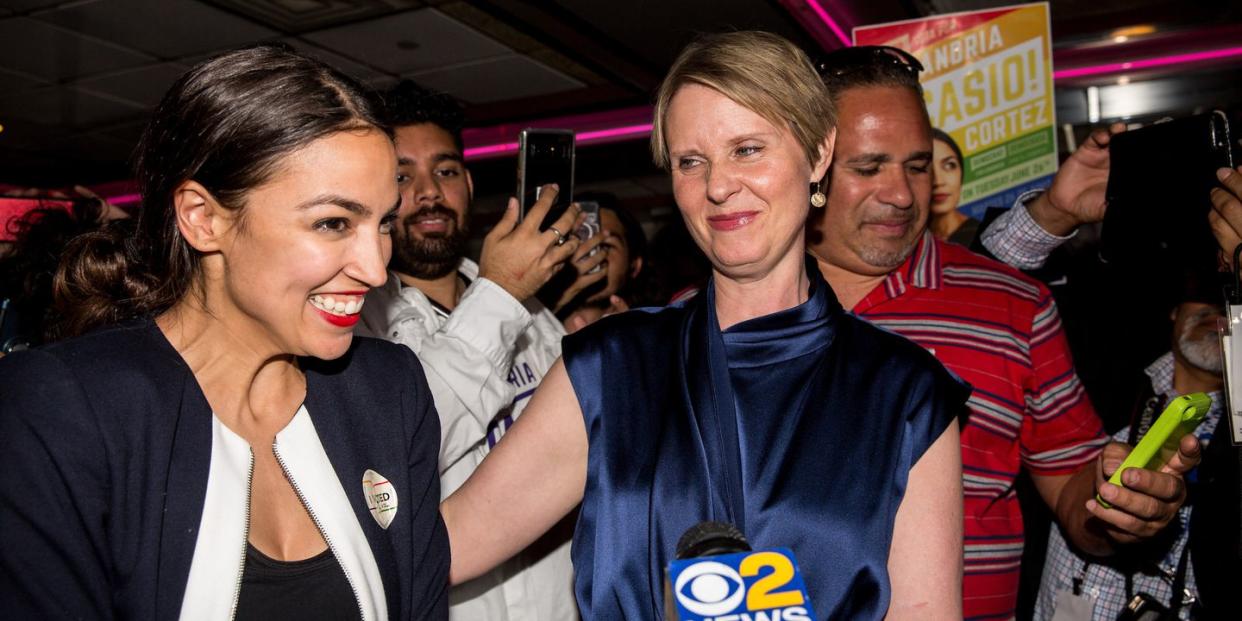This Ad Shows What Ocasio-Cortez's Victory Means

A year ago, Alexandria Ocasio-Cortez was working at a cocktail bar in Manhattan. Now, she will almost certainly be the youngest woman ever elected to Congress.
In Tuesday night's Democratic primary, the daughter of a Puerto Rican mother and a father from the Bronx defeated Joe Crowley, a titan of the New York Democratic machine who has sat in Congress since 1999 and was widely seen as a potential successor to House Minority Leader Nancy Pelosi. He spent $1.1 million on the contest to represent large swathes of Queens and the Bronx in New York's 14th congressional district, including big corporate money from Google and Facebook. She spent $128,140, all from individuals.
It may be an indication of a seismic shift in Democratic politics, not unlike House Majority Leader Eric Kantor's defeat by Tea Party challenger Dave Brat in 2014. Except unlike Brat, who slammed Kantor for lacking hardline credentials on immigration, Ocasio-Cortez is a 28-year-old Latina and an unapologetic Democratic Socialist. To her, the label means she fights for working people. But beyond that, hers is a working-class American story, a New York story, and a Bronx story-one beautifully told in a campaign ad she ran that had echoes of would-be Paul Ryan challenger Randy Bryce.
This is why Ocasio-Cortez won.
pic.twitter.com/FbWyvAJHOq- laney (@misslaneym) June 27, 2018
More than anything, Ocasio-Cortez's message is rooted in that old American idea that you elect someone from your community who will actually represent you. The subtext, of course, was that Crowley was not really from the community and was not fighting for its residents.
"It's time we acknowledge that not all Democrats are the same," Ocasio-Cortez says. "That a Democrat who takes corporate money, profits off foreclosure, doesn't live here, doesn't send his kids to our schools, doesn't drink our water or breathe our air cannot possibly represent us."
Ocasio-Cortez proudly touts the label of Democratic Socialist, a hot-button term in our politics, but her platform does not seem all that radical. She backs a Medicare for All healthcare system, which enjoyed the support of 63 percent of all registered voters in a recent poll. She backs tuition-free public college, which also enjoys 63 percent support-including nearly half of Republicans. She champions criminal justice reform, long characterized (somewhat naively) as a bipartisan initiative.
The only positions that mark her as a left-of-center Democrat are her support for a federal jobs guarantee-a newish initiative gaining steam with even centrist Democrats like Corey Booker-and her unequivocal intent to abolish ICE. That last one might be more mainstream soon enough, particularly after the human rights crisis at the southern border last week manufactured by the president and his immigration priorities.
She took on the idea her platform is "radical" last night, as she watched the returns come in and confirm she had defeated a 10-term incumbent, live on local NY1. Her incredibly endearing reaction is worth the price of admission, but so is her off-the-cuff talent:
This video of @Ocasio2018 seeing the election results live on NY1 is wonderful. And nice @DemSocialists t-shirt in the background. Thank you @nycdsa for helping to make this happen!!! pic.twitter.com/GRNYY0GlZv
- Stephanie Palumbo (@SJPalumbo) June 27, 2018
"I think what we've seen is that working-class Americans want a clear champion," she told the interviewer, "and there is nothing radical about moral clarity in 2018."
The subtext-and the hulking shadow over every political question of the current moment-was one Donald Trump, American president, who reacted to this result with a tweet indicating he has a shall-we-say loose grasp on current electoral politics. He was soon backed up by the lead spokesperson for the Republican National Committee in a sign that both must believe the realities of what happened during Tuesday night's primary will never penetrate the information bubble inhabited by their base of support.
Ocasio-Cortez cast the result as a victory in the "deep midnight and darkness" of the political moment, one with roots deeper than the current president. Yes, Donald Trump rose on the dark forces of racism, misogyny, and resentment over a country rapidly changing. But he was also possible because of a desperation growing in the hearts of too many Americans, who are working longer hours, can't get a raise, don't have adequate healthcare coverage or educational opportunity, and generally do not believe that their children will have a better life than they did. That is to say, they lost hope.

Alexandria Ocasio-Cortez's story is the split personality of the city of New York: It is the beating heart of the nation of immigrants, a firm rebuke to the monoculturalism of Donald Trump's movement. And yet it's a flashpoint for the inequality of wealth and opportunity that has fueled, in part, the volatility of the current political moment. In the ad, Ocasio-Cortez mentions the "changes" that New York-and, indeed, the country-has undergone in the last couple of decades, in which the city's rich have gotten richer and the poorer have gotten poorer.
"It's clear," she says, "that these changes haven't been for us."
The Democratic Party's most powerful figures, including New York Governor Andrew Cuomo, will not be able to ignore what happened here. Crowley was a fixture of Democratic leadership in the House, and just yesterday, Ocasio-Cortez and Cuomo challenger Cynthia Nixon endorsed one another.
The Queens residents Ocasio-Cortez will likely now represent speak at least 138 different languages. It is "the capital of lingustic diversity, not just for the five boroughs, but for the human species." One three-block section of Queens is home to immigrants from 51 countries. But these New Yorkers also face the same kitchen-table issues, from healthcare to education to wage stagnation, that working-class Iowans do. In a sign of our tumultuous times and the bubbling currents of the great American melting pot, Ocasio-Cortez will be tasked with representing all of that. She seems a decent choice to do so. After all, to varying extents, she is all of that.
You Might Also Like

